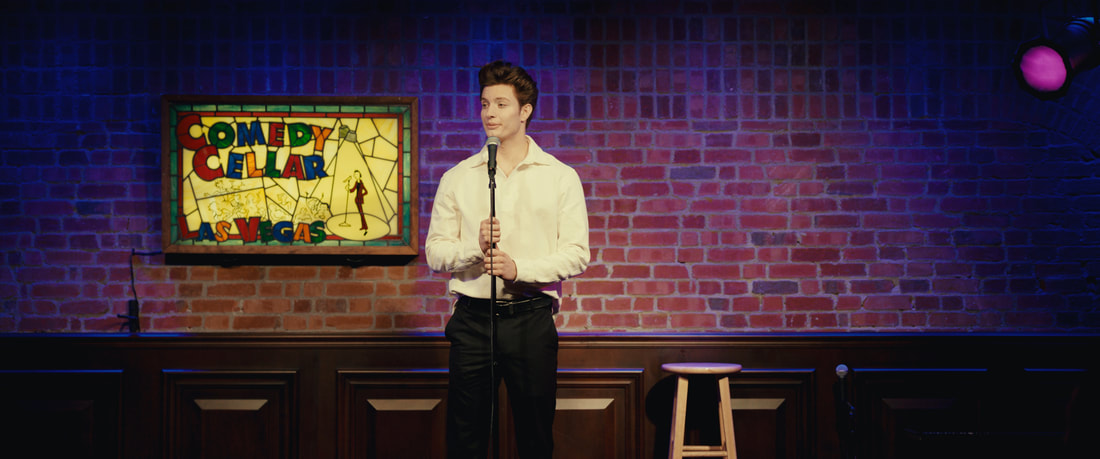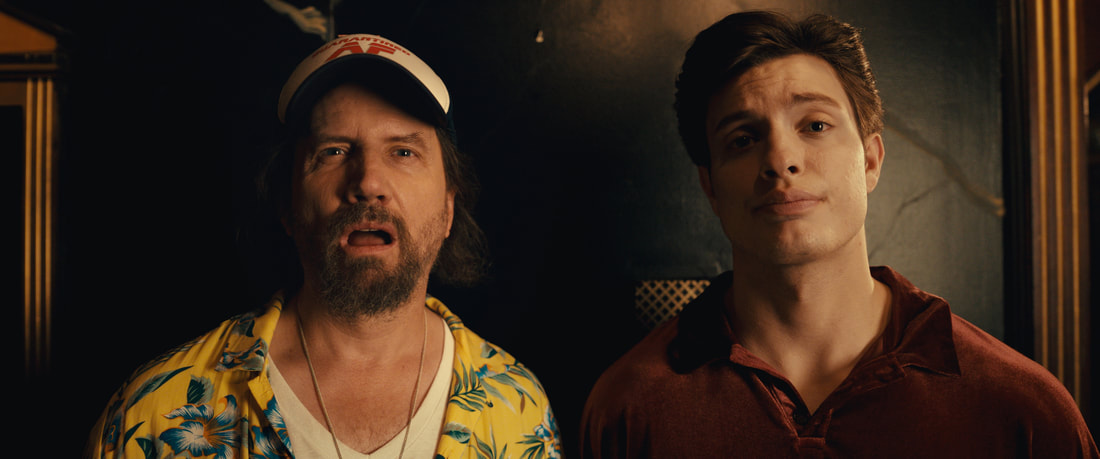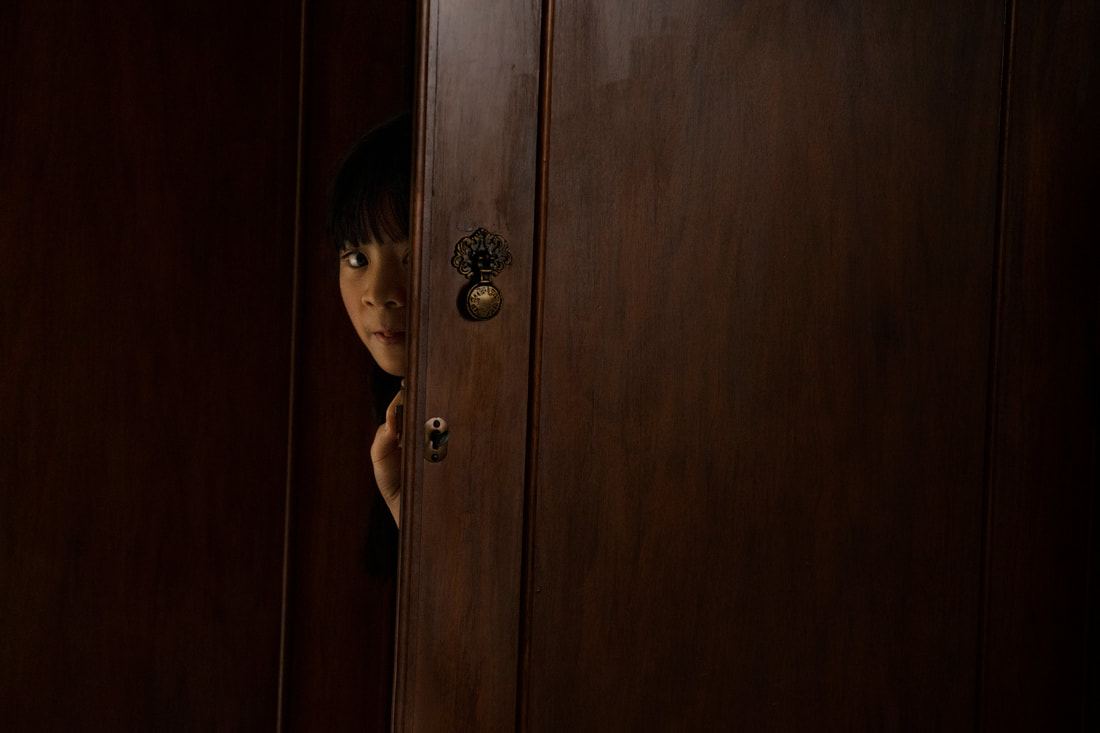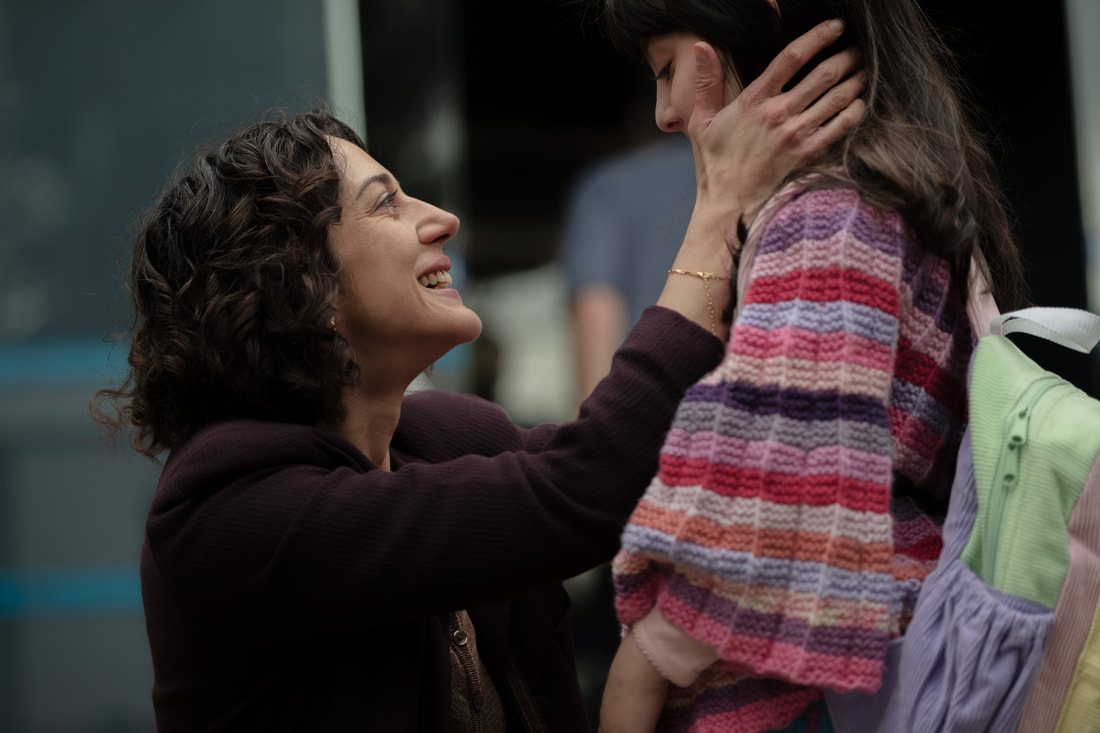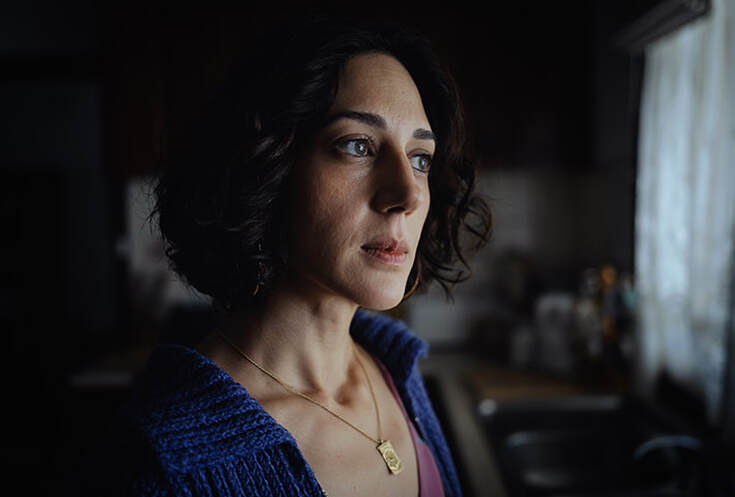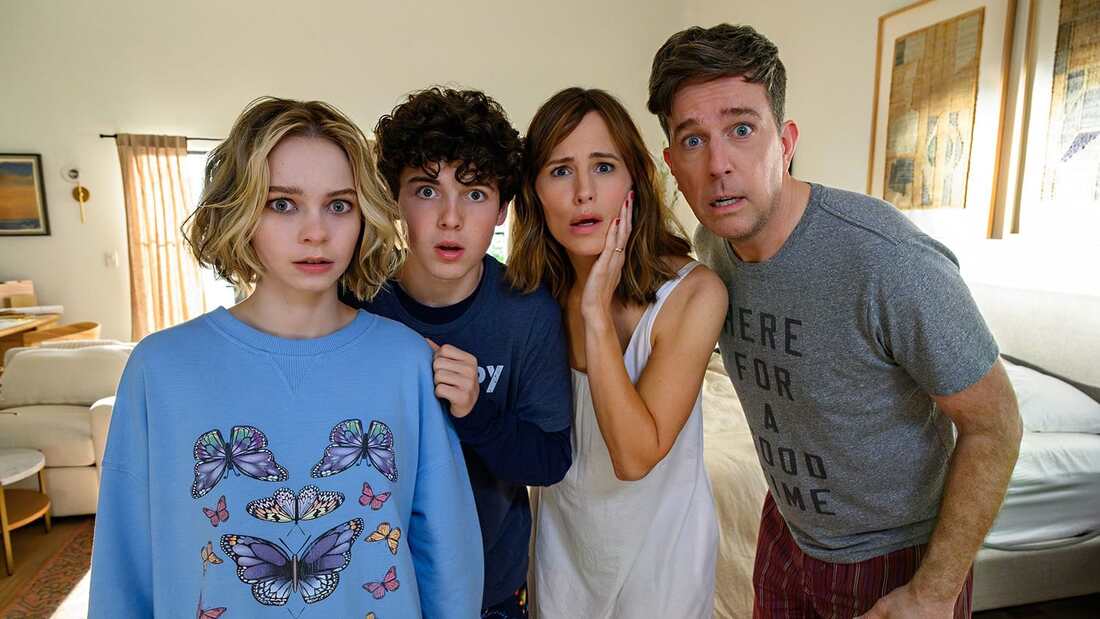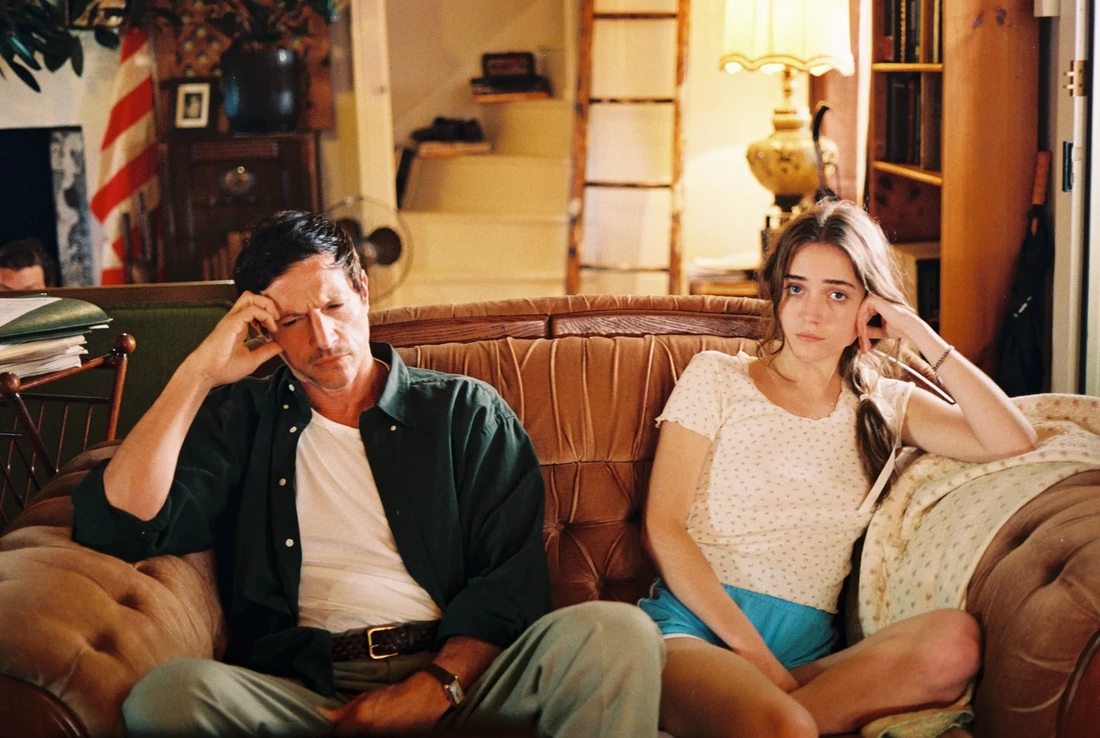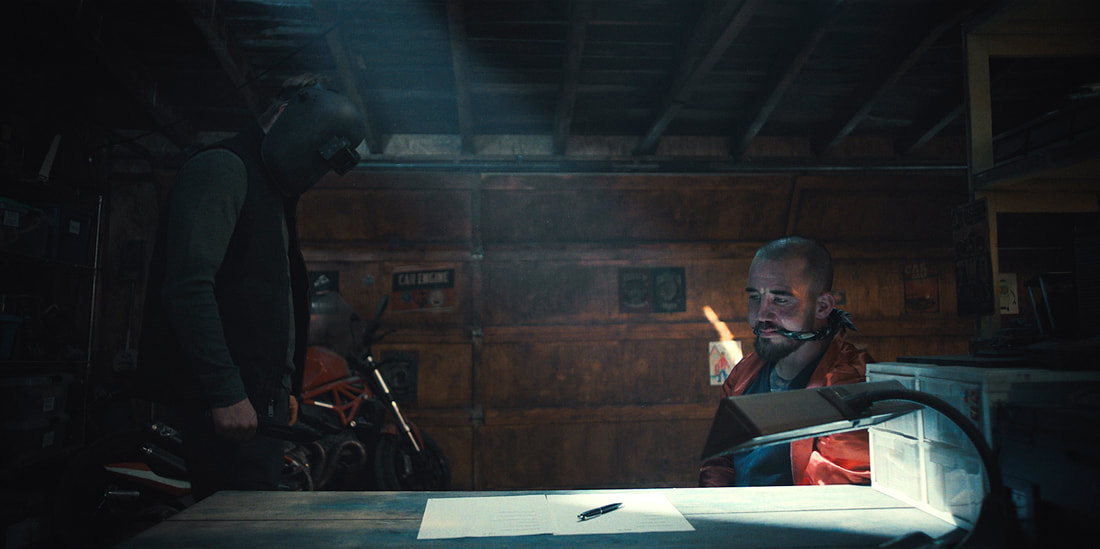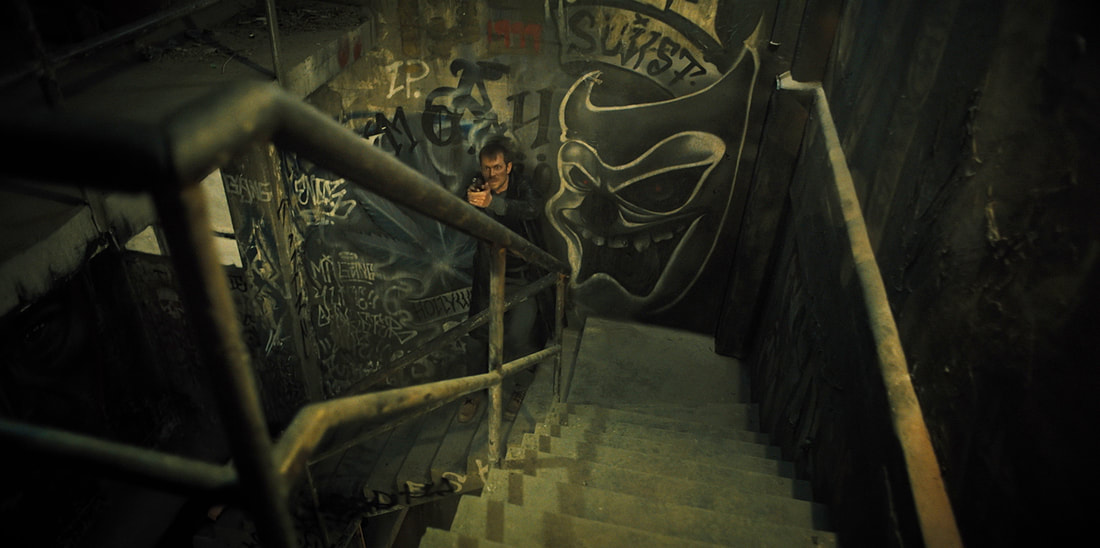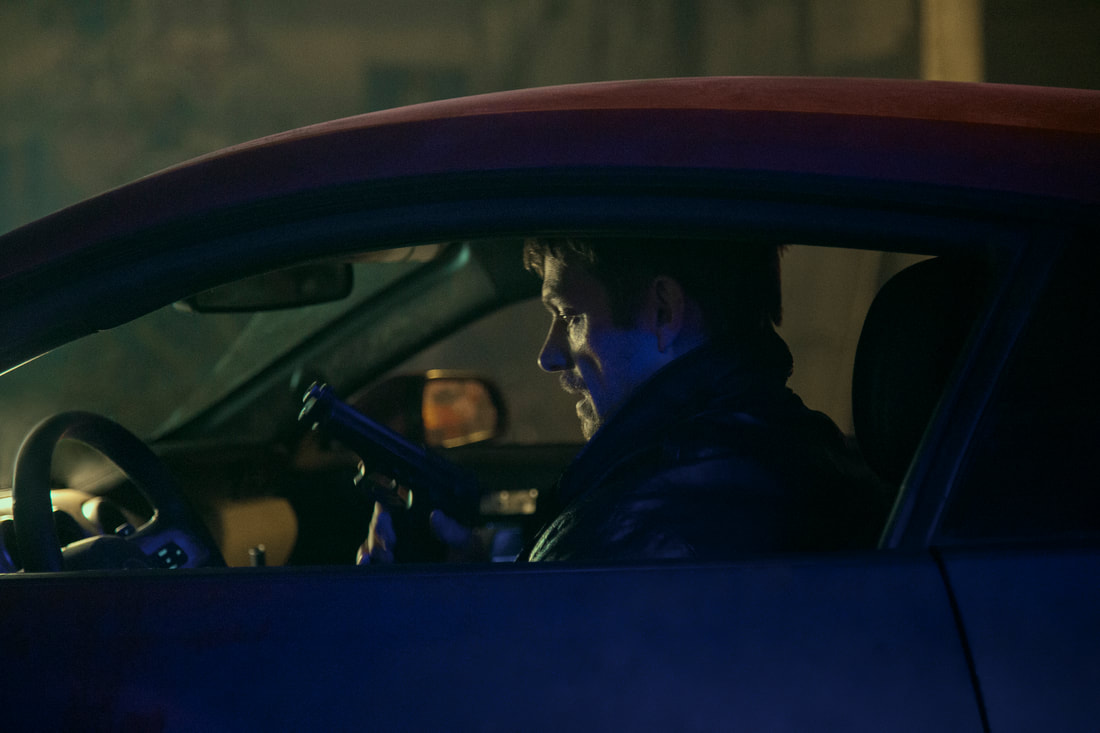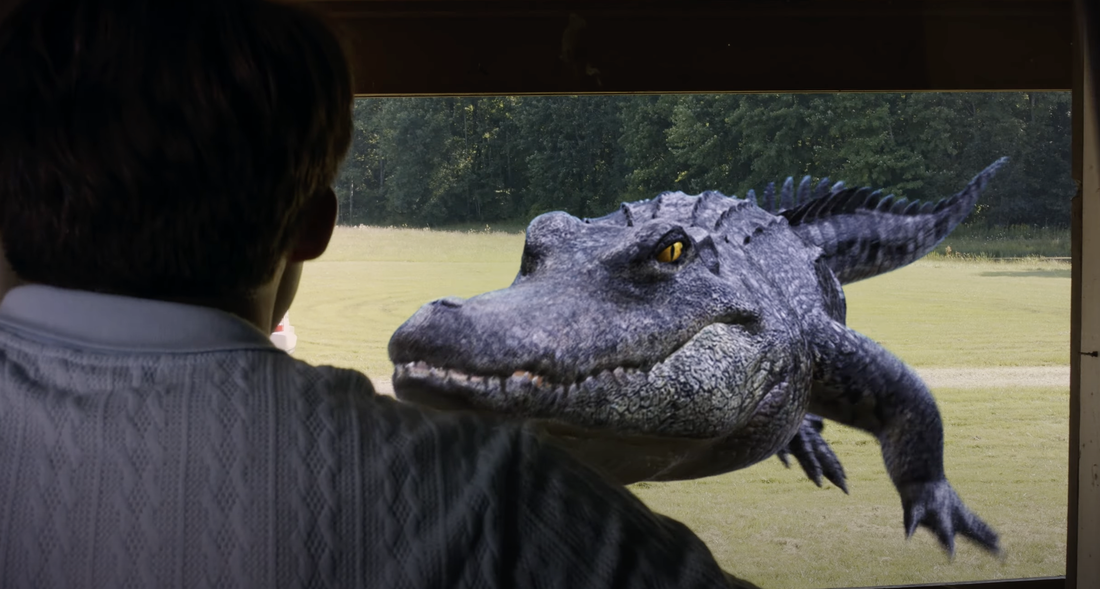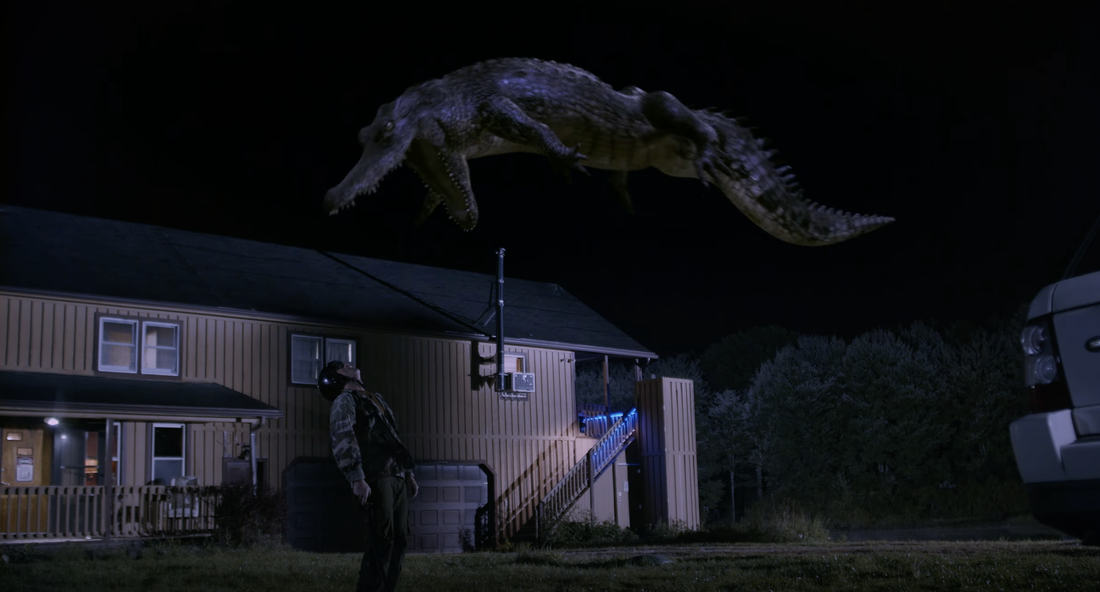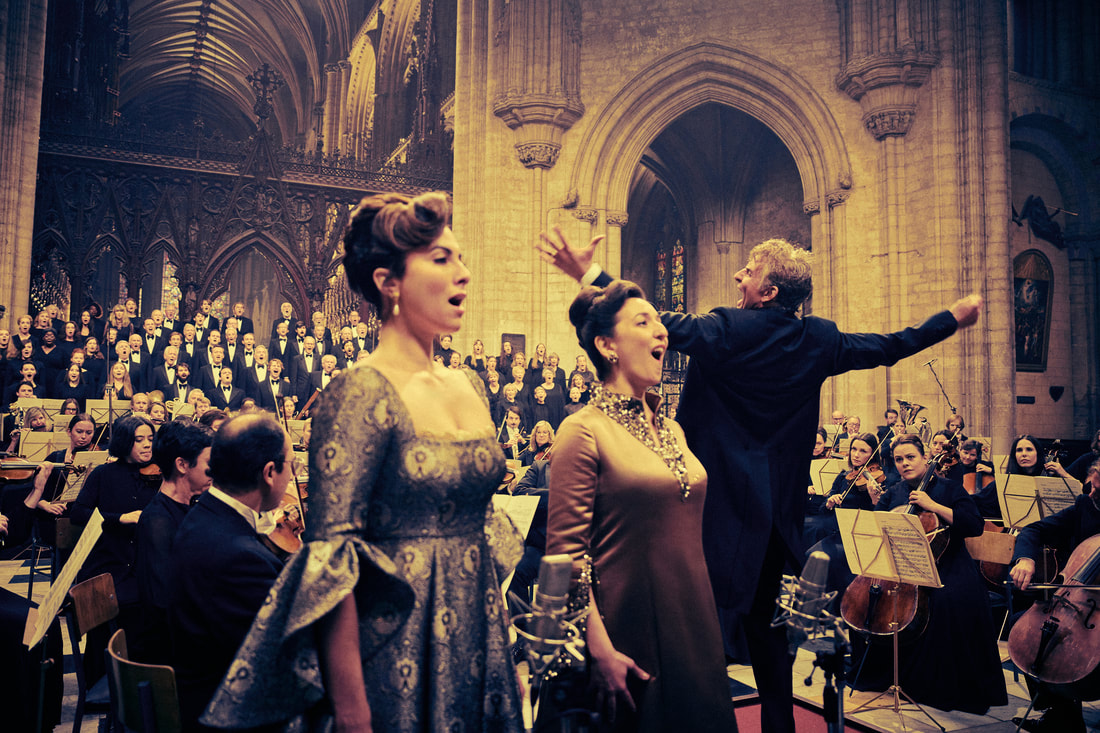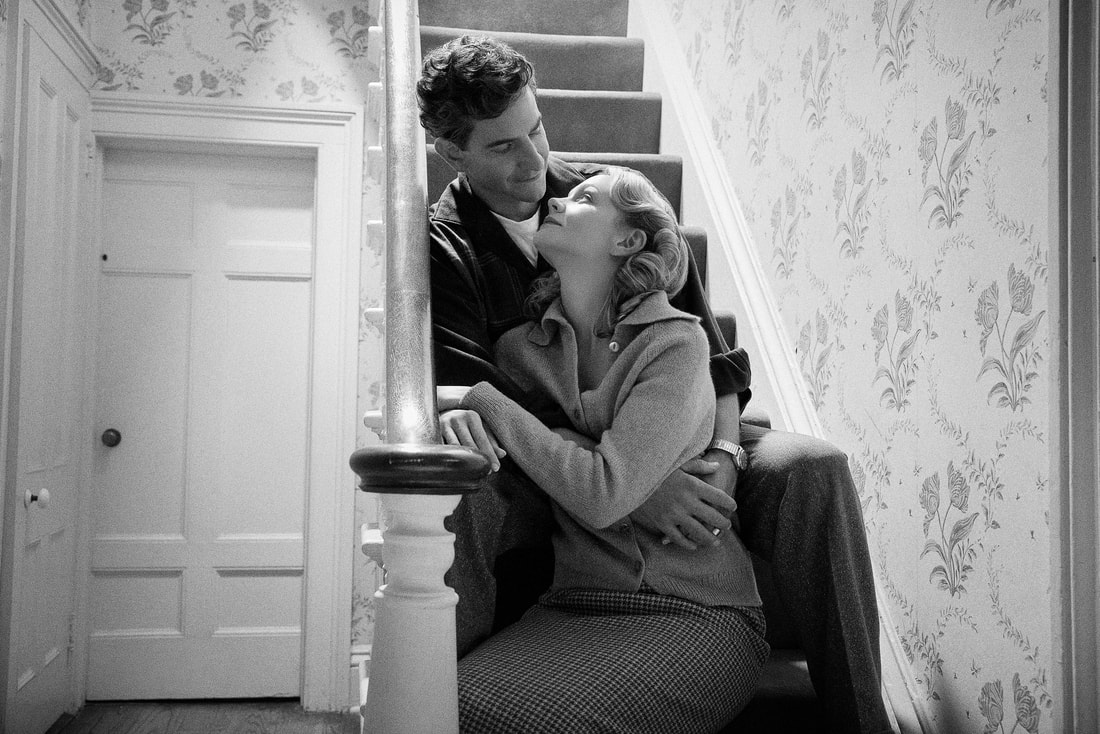|
Review by Cole Groth It’s a shame that modern Hollywood has failed the vampire. The Twilight series has made the undead bloodsuckers a laughingstock of a character archetype, and garbage, like Don’t Suck, continues to keep them as a joke — and in the case of this horror-comedy, a very bad one. RJ Collins badly directs a messy film that winds up with almost no laughs throughout its 100-minute runtime. Pete (Jamie Kennedy) is a schlocky comedian who’s uncomfortable in his position telling unfunny jokes to small crowds as a road comic. After witnessing a vampire (Matt Rife) who manages to almost impressively bomb at one of his gigs, the two take a road trip that’ll leave both of their lives changed forever. Their trek across the country through dirty comedy clubs takes Pete on a journey of self-discovery as he tries to become a “comic’s comic": someone other comedians try to look up to. For a movie about comedy, it’s a shame that this isn’t funny. There are a few jokes that strike, but for every ten jokes, nine of them are either mean, stupid, or horribly delivered. Few make sense, and almost all of them fall flat. Writer Rick D’Elia’s script is simply horrible from a comic level, but the vampire stuff is admittedly pretty interesting. There’s enough potential here to where the end result feels almost insulting and like a true missed opportunity. It’s bad enough that the movie sucks, but for it to introduce an interesting idea and ignore it is one of its biggest sins. Jamie Kennedy is a horrible leading man. He’s this horrifically unfunny, misogynistic, and creepy man whose presence on screen is a constant eyesore. For some odd reason, his character has this hot trophy girlfriend who seems to serve as the writer’s insert for whom he wishes he could date. In any case, it’s also a bizarre choice. His counterpart, the vampiric Matt Rife, has a much better appearance on screen. He’s a lot more subtle and does a decent job of being this broody vampire with a knack for bombing at stand-up comedy.
The biggest problem with this type of movie is that it falls too heavily into mean-spirited humor. It’s the type of movie that tries too hard to be offensive in an attempt to be “canceled” for internet hype. It meanders through a boring plot and several unlikable characters to a conclusion that feels confusing and emotionally unearned. Ultimately, Don’t Suck… sucks. The funniest part of the movie probably comes from the title. If you’re a huge Matt Rife lover, I’ve heard that his type of comedy might fall in line with this film, so it could be appealing to you. To those who like well-written and subtle humor told by not directly hatable characters, this one is the easiest skip of the year. Don’t Suck releases in theaters and on demand December 1. Rating: 1.5/5
0 Comments
Review by Joseph Fayed The plight of an immigrant could easily be nightmare fuel. Raging Grace is Director Paris Zarcilla's SXSW award-winning debut that tells the story of one immigrant that takes a sinister turn but also mostly follows familiar horror tropes that leave its antagonists and its ultimate message not as terrifying as they were meant to be. Joy is an undocumented Filipina immigrant trying to secure a better life for herself and her young daughter, Grace. When she lands a job as a caretaker that she simply can't refuse, she soon discovers a grisly secret about her employer that could jeopardize their lives. Without wanting to play into stereotypes, the film handles its characterization of Joy well. Joy is very determined and, under her circumstances, does not buckle under whatever is thrown at her. Her arc revolves around respect from those who feel she has invaded their environment, and she consistently stands on her own two feet to demand that. Developing such strength for a character midway through would have been difficult for a protagonist meant to have endured the worst throughout her life. Shedding off her past so suddenly would have been too confusing. On the other hand, Joy's employers, Katherine and Mr. Garrett, both embody prejudice, which manages to contrast each other at times, but it's done to a laughable extent. Katherine is more upfront about hers, and the terminally ill Mr. Garrett slowly reels you in with his. Any moment a character is supposed to feel angry is unintentionally hilarious. At one point Katherine has something that I can only describe as a Marty Wolf from Big Fat Liar-esque meltdown. This immediately turns into a serious confrontation between her and Mr. Garrett without addressing what just happened that led to said meltdown. This occurs just before the reveal of what exactly Katherine and Mr. Garrett have been hiding from Joy and Grace. The reveal isn't much of a mystery, as any clues on what may be hidden are kept until the third act, which is also when almost anything significant happens. This does not include a memorable sequence towards the end that is clearly meant to be paranormal, set up like a parody of Insidious.
Tonally and pacing-wise, Raging Grace is very messy. You will be engaged with the plot at times, but for all the wrong reasons. Its performances delve into camp territory, which ironically becomes the most memorable aspect of any of this. If you're expecting to explore the inner demons of a wealthy family and how their immigrant housekeeper is driven insane by them, you're expecting too much to be adequately fleshed out. This psychological thriller will only leave you second-guessing how this won over the grand jury at SXSW. In the meantime, go watch Nanny by Nikyatu Jusu for a better tale about an immigrant wanting to help her child, which comes at the cost of disturbing breaks from reality and heartbreak. Rating: 2/5 Review by Jonathan Berk Director Noora Niasari’s film Shayda isn’t technically a horror movie. However, it contains several moments scarier than films labeled as such this year. Niasari captures the horrors of escaping an abusive relationship and navigating the societal and legal struggles of divorce and custody. She also manages to capture the hope of the future, the power of possibility, and the love of a culture — even when it feels like that culture may not love you quite the same. Shayda is a powerful and affecting film with an equally impressive lead performance. Shayda (Zar Amir Ebrahimi), an Iranian immigrant in Melbourne, is living with her young daughter, Mona (Selina Zahednia), in a women’s shelter led by Joyce (Leah Purcell). She is fleeing her abusive husband, Hossein (Osamah Sami), hoping to start a new life while protecting Mona, but the legal process of a custody fight and societal pressures may be too much. Ebrahimi is a quiet powerhouse. She conveys so many emotions with just her body language and looks. In an early scene, Joyce and Shayda sit in a room on speakerphone, recounting an attack Hossein had inflicted upon Shayda. The camera work and the lighting make the moment feel intense, but it is Ebrahimi’s shaking and vacant look that conveys a plethora of emotions, as the details of the attack are still very real to her. She bursts out of the room, and the camera pans over to show her through the doorway. We can’t escape this, and we have to live in the moment, watching the fear flood out of her through this powerful early scene, showing the director and actor working together to deliver an affecting moment. The film will be triggering for anyone who has ever been in an abusive relationship or is the child of one. The first time Hossein is introduced, many will feel he seems like a man trying to win back his family. However, those with these past experiences will immediately sense the hostility boiling under that calm demeanor. Sami plays the role all too perfectly, and as the film moves on and Hossein feels his family gets further away, the true monster boils over. There are some truly haunting scenes in this film, and Zahednia’s reactions to them make them all the more troubling.
Despite the many upsetting moments, there are several moments of real joy. There is a great bonding moment over Mona’s new goldfish, Simba, and what he symbolizes as part of a Nowruz tradition. However, it’s hard to deny that the happy moments — like Shayda dancing or Mona getting a necklace — aren’t shadowed by the dark cloud that is Hossein’s existence. Much like a person fleeing a hostile situation, we are always looking over our shoulder; sure that at any moment, our optimism will be shattered by reality. Niasari’s debut film is extremely personal and based on her own childhood upbringing. However, her story is one that many people can sadly relate to. There are many threads within it that audiences may attach themselves to. You may also, like myself, find that Shayda has embedded itself into your psyche as you watch it. Shayda releases in theaters on December 1. Rating: 5/5 Review by Cole Groth McG’s had an exciting filmography, with campy slasher, fun action flicks, and a critically maligned Terminator sequel under his belt. If you had to guess what was next for him, you probably wouldn’t have guessed Family Switch, a body swap comedy about a dysfunctional family who live through a tumultuous Christmas while occupying the bodies of their older or younger relatives. It’s a straightforward film with a mixed bag of cheesy jokes, but the emotional core keeps this from being anything less than enjoyable. At first, Family Switch seems doomed to be an incessantly annoying comedy. The family — played by Ed Helms, Jennifer Garner, Emma Myers, and Brady Noon — have the annoying stereotypes expected with this kind of movie. The mom is a strong leader, and the dad an incompetent fool. Both can’t connect with their son, who’s too busy acting like he’s the smartest kid in the world, and daughter, who cares more about sports than anything else. The family is a mess, and the setup doesn’t seem funny. After a day of arguing leads them to a telescope and a wish that they would spend a day in each other’s shoes, the family finds themselves in the titular predicament. Hilarity ensues. No, seriously! It’s a very funny movie, and director McG does a good job of keeping it relatively fresh as a concept. It’s generic plot-wise, but works well because the cast is a lot of fun. There’s a sequence where the parents (in their kids’ bodies) go out to a party, and that scene stands out as the best of the movie. Some of the jokes are eye-rollingly stupid, and some are genuinely hilarious. It’s uneven, to be sure, but funnier more often than unfunny. The leading cast feels all too familiar in the beginning, but once the switch is made, they’re a lot of fun. Jennifer Garner is funny (and pretty gross), and Ed Helms plays a mostly familiar role, but the real standouts are Emma Myers and Brady Noon. Myers, in particular, does a good job of acting like an adult in a kid’s body. Rita Moreno and Matthias Schweighöfer have minor roles and are both excellent additions to the cast.
On a technical level, there’s nothing to write home about this. The world the Walker family occupies feels pretty realistic, and the production design is nice. From an editing and cinematographic perspective, it’s nothing remarkable. The pacing is good, and the story as a whole feels helped by a 105-minute runtime. For families looking for a holiday movie, this is a great option to watch. It’s great fun for kids and has some good jokes that’ll keep adults happy, too. With fun leading performances and a good holiday atmosphere, it’s an overall solid watch for the Christmas season and a good addition to McG’s filmography. Family Switch releases on Netflix on November 30. Rating: 3.5/5 Review by Camden Ferrell For the last several decades, the International Chopin Piano Competition has been held every five years. It is one of the most prestigious classical music competitions, and it’s a showcase for some of the most talented young pianists in the world. Jakub Piątek’s gives us an intimate look at the 2021 competition in his documentary Pianoforte. This movie premiered at the 2023 Sundance Film Festival, his second movie to do so. This is a straightforward yet entertaining documentary that gives a spotlight to emerging young talent among the backdrop of a stressful yet rewarding competition. The competition takes place in Poland, and the film gives us a behind-the-scenes look at the competition and what each of the contestants go through during this time. The film primarily focuses on a handful of pianists from all over the world as they navigate the competition and their own personal lives. This premise is one that will interest fans of classical music or those who enjoy the spirit of competition and unmitigated passion. The narrative structure of this documentary is very conventional, but it works for the story that is being told. It’s a straightforward story that is easy to follow and told in a simple and linear manner. This allows the film to properly capture the contestants’ mindset and behavior at each individual stage of the competition. As candidates begin to get eliminated, it’s easy for us to root for the subjects of this film as we see them grow and try and prove they’re the best. Piątek plays it pretty safe as a director, but it’s ultimately to the film’s benefit. The subjects that we follow are all unique and interesting in their own ways. Viewers will likely find at least one contestant with whom they can relate. Even if you don’t relate to them, it’s easy to see how passionate they are about their craft, and when someone loves what they do that much, it’s hard not to be invested. I was most invested in Hao Rao, a young Chinese pianist as he travels across the world with his longtime teacher. He perfectly captured the familiar combination of dynamic and confident onstage presence and the critical and reserved player offstage. Each contestant brings something new to the table, and the documentary balances them well, to prevent the film from feeling slow and oversaturated in certain areas.
Obviously, a documentary of this nature should have good musical scenes, and it does for the most part. The works of Chopin are classics to the entire world, and it’s fascinating to see these young players perform them. However, I feel like these scenes aren’t nearly present enough in the film. We get plenty of insight into their lives offstage, but the scenes of their performances are mostly abbreviated more than I would have appreciated. Clearly, it’s senseless to include entire performances in a movie, but it definitely could have been more fleshed out. Pianoforte is a simple yet effective documentary about one of the most prestigious piano competitions in the world. We get a glimpse at some of the most impressive young musicians around today, and it gives audiences an idea of what they’re going through at every stage of the competition. We revel in their success, and we empathize with their missteps. It’s an entertaining documentary more than anything, and it is a strong showcase of Piątek’s storytelling abilities. Pianoforte is in theaters December 1. Rating: 4/5
Review by Sean Boelman
With an all-star cast of cinephile favorites who have blown up over the past year, including Jacob Elordi and Ayo Edibiri, The Sweet East might be one of the most singular, esoteric debuts in recent memory. Although the film doesn’t always work, its certainly admirable, thanks to the clear ambition on display.
The movie follows a teenage girl who, after getting separated from her peers on a class trip in Washington, DC, gets her first unexpected glimpse into the real world. What starts out seeming like a pretty standard road movie evolves into something more quirky and sinister as it goes on before culminating in a finale that’s undeniably wild yet works surprisingly well in context. In terms of what The Sweet East has to say, there’s some very sharp commentary — particularly in the first act — on the absurdity of the white supremacy movements that emerged in the fringes of American society but have become scarily mainstream. Few films on the topic have managed to so effectively convey how these disgusting individuals manage to look “normal” and could be among us. The supporting cast has a few recognizable faces, all of whom are entirely game for the movie’s weird vibes. Simon Rex is fantastic as a white supremacist, having a duplicitous charm about him that makes the character all the more menacing. On the opposite end of the spectrum, Ayo Edibiri and Jeremy O. Harris are wonderfully flamboyant as idiosyncratic filmmakers, and Jacob Elordi has yet another scene-stealing turn (his third this year) as a heartthrob actor.
However, none of these performances would make much of an impact were it not for Talia Ryder’s commanding leading performance. From a scene early in the film where she sings an enchanting song into a mirror, Ryder is completely spellbinding. She is very quiet in the role but has a commanding presence nonetheless.
The transfixing nature of Ryder’s performance is further complemented by the movie’s aesthetic. Shot in 16mm, The Sweet East has a grainy, dreamy aesthetic that will remind viewers of old-school Americana, creating an interesting juxtaposition against the film’s snapshot of the modern-day alt-right. For much of the first half, it feels like the movie is trying to be a cringe comedy — particularly as we deal with the discomfort in the relationship the protagonist forms with Rex’s white supremacist. If this wasn’t enough to alienate some viewers, others will be thrown off by an absurd turn in the second act. Those who make it through both of these tones will be on board with the film’s weird wavelength. The Sweet East uses its warm aesthetic and charming performances to deliver a stunningly terrifying truth about our world. Although its unorthodox approach is unlikely to resonate with everyone, this is a confident debut for director Sean Price Williams and writer Nick Pinkerton. The Sweet East hits theaters on December 1. Rating: 4/5 Review by Daniel Lima It is incredibly hard for an artist, no matter how great, to sustain creative success into perpetuity. Circumstances change, the artist changes, and eventually, they are forced to either adapt and find new things to say, new ways to express themselves, or otherwise become a pale shadow of what they once were. With Silent Night, his first American production in over two decades, legendary director John Woo attempts to prove that he still has what it takes to deliver an emotionally charged and exhilarating action film. It might be a laudable effort in theory, but it quickly proves to be bereft of all the things that made him so acclaimed in the first place. Joel Kinnaman plays a man who, after his son is killed in a drive-by shooting on Christmas Eve, prepares himself for a one-man war against the street gang that shot him. As an added twist to this well-worn revenge narrative, there is no dialogue, forcing the entire story to be told through visual and musical cues. It's a novel take on the formula, and one could imagine the John Woo of the 80's Hong Kong New Wave knocking it out of the park. To his credit, the director does commit to the conceit. The storytelling is always crystal clear, laying out the characters' goals and motivations, allowing a handful of expressionistic flourishes to sell their emotional state, and developing the investigative plot as Kinnaman unravels the criminal organization. Without prior knowledge, one wouldn't guess that this is the work of a septuagenarian working within an industry he hasn't been a part of for decades; this feels like the work of a young director given the opportunity to do something a bit off-beat. Not feeling like a John Woo movie, however, is a double-edged sword. It cannot be overstated how important Woo was to action cinema, with an unparalleled ability to imbue the most explosive, kinetic set pieces ever devised with pathos and beauty beyond most straight dramas. His best work interrogated notions of honor, loyalty, and brotherhood, possessing a rhythm and look unlike anything else at the time. Even his lesser Hollywood work, compromised as it was by executive oversight, still felt like it was coming from a singular auteur. As recognizable as his ideas and motifs were, he was nearly impossible to replicate. Those idiosyncrasies are absent in Silent Night. Woo's keen visual eye, once so textured and intimate, has given way to a rote mid-budget studio sheen, looking like any number of anonymous Netflix releases. Beyond the low contrast lighting and workmanlike compositions, there is a curious lack of all of Woo's typical embellishments: the slow motion, the transitions that allow scenes to flow into each other, even the doves (a parrot shows up early on, seeming like a thumbing of the nose at the viewer's expense). The exceedingly rare moment where he does take a swing, typically quite at home in his more overtly stylized and melodramatic work, stands out as a non-sequitur in an otherwise grounded film. Perhaps this is Woo deciding to do away with what people expect of him, or maybe the realities of shooting an action film in 2023 on an American studio's dime preclude their inclusion. Either way, the result is a predictable revenge thriller that, while not especially ugly compared to its contemporaries, looks like it might have been directed by anybody. That gimmick only goes so far in distinguishing the film. The "one man seeking vengeance" power fantasy is familiar to modern audiences, one that has never called for much dialogue, and Woo is more acclaimed for his direction than his screenwriting. It quickly becomes evident that its lack won't be much of an impediment, so the film's unique element ends up being moot. More debilitating than the speechless characters is the actual narrative structure. Kinnaman is not a ruthlessly efficient killer at the start, so he must train and prepare himself for his crusade for an entire year, intending to mete out justice on the anniversary of his son's death. That means most of the film is just a training montage, watching this silent, bland protagonist steel his body and mind as he withdraws into himself. Without Woo's trademark style lending this a particular verve and heart, there is no reason to remain emotionally engaged in his quest. By the time the action starts in earnest, it's a challenge to muster up the energy to care. For as long as the action is withheld, in the latest film from the consensus pick for the greatest action director of all time, what is here is sorely lackluster. A classic John Woo gunfight is impeccably composed, a tightly controlled cacophony of violence, but it was also operatic, baroque, and grandiose. As booming and destructive as the bullets and the car crashes were, there was always grace, with the action serving as a particularly out-sized representation of whatever animated Woo at the time. Even his previous American outings, hampered as they were by studios, managed to retain these qualities. Here, in the final act that all the big set pieces are relegated to, he is as clamped down and restrained as the rest of the film, eschewing all his trademarks in favor of the modern 87eleven style of action. It's bloody, brutal, and tactical — all the hallmarks of any movie influenced by John Wick (Jeremy Marinas, fight coordinator for the latest in that franchise, served as stunt coordinator here). It's not bad action by any stretch of the imagination, certainly not by the low standards of Hollywood. It's all clearly photographed; characters move through the environment and actively utilize it in the choreography, and it does maintain a sweaty, desperate energy. What it lacks, unfortunately, is anything to distinguish it from dozens of other bloody, brutal, and action set pieces in the past five years. Maybe Woo truly was energized by the changing landscape of action cinema and wanted to play around here. Perhaps he was forced to hand over the reins to a younger pair of hands, but either way, the style he pioneered is completely absent. Even a hint of the old master would have been welcome in 2023, where even the best action set pieces lack the deep emotions that Woo was able to weave into them. To see even the climactic payoff of this film be so indebted to others, rather than a reflection of Woo's own predilections, is nothing but disappointing. In truth, this is the inescapable flaw of Silent Night: it does not feel like the work of John Woo, an artist whose fingerprints can be seen in everything else he's ever touched. As bombastic as his most celebrated works are, they always have something more on their mind, underpinning all the cordite smoke, blood, pain, and chaos. The Killer questions how feasible a black-and-white moral code can be in a world of gray, if arbitrary societal divides are insurmountable, and whether redemption can ever truly be attained. Bullet in the Head is a bleak and tragic portrait of suffering and war, actively challenging his penchant for finding serenity in violence. Even Paycheck, his last American outing, offered a fleeting interest in the nature of fate and predestination. By contrast, this film is just a bog-standard thriller. There's so little going on beyond the shallow stylistic exercise that it's hard to take even the questionable portrayal of minorities and women to heart (though admittedly, the latter, in particular, is a thread in all his films). If one were uncharitable, there's not much stopping an interpretation where this movie is Woo announcing a full-throated endorsement of vigilante justice, as there is no sign that his undertaking is anything other than cool and justified. Or perhaps that would be charitable because it would mean the director had some actual stake in a project otherwise lacking any personal stamp.
Arguing that an artist should not change their style is ludicrous, but Silent Night is not a director stretching his wings. This feels like a mercenary gig, with John Woo acting as a gun for hire, and that lack of investment in the material is evident in every solitary frame. From any other filmmaker, this might have been a bland, forgettable actioner, soon consigned to the ashbin of cinema history. From the man who made Hard Boiled, this is an especially embarrassing misfire. Silent Night arrives in theaters December 1. Rating: 2.5/5 Review by Adam Donato The uninitiated would be surprised to find out that Bad CGI Gator is not associated with 2019’s Bad CGI Sharks. At least that movie had a 90-minute runtime, despite most of the cast lacking pictures on their IMDb profile. Danny Draven directs Bad CGI Gator, which makes sense since his last feature was Weedjies: Halloweed Night. He’s been directing crappy movies since the early 2000s. With a title self-aware about its budget, will the joke be as funny as the movie thinks it is? Six sexy college students vacation at a cabin in the middle of the woods. When one of the girls has aspirations of going viral, she convinces the gang to throw their laptops into the water as a form of protest. The group is split into couples for the most part: the meathead and the social media-obsessed; the douchebag guy with the airhead girl; The meathead’s shy younger sister; and then a third guy who is a dork and the other two couples hate. The audience is supposed to root for the two dorks and enjoy watching the other two obnoxious couples become fodder for a bad CGI gator. In this regard, the story does function, as the characters are over-the-top annoying. Luckily, the run time is just under an hour. Imagine if they inflated the run time to ninety minutes to make it feel more like a real movie. Enough time is spent with these characters as it is. It’s mildly funny to laugh at how cartoonishly ridiculous everyone is. The bad CGI gator is the real audience grabber here. When the gator bites the laptops the group ignorantly threw in the water, it starts to electrocute him, and he grows a few sizes. Ironically, the CGI gets better when he grows bigger. Maybe it’s just because more detail can be seen when it enlarges and looks like it actually has a design. This is opposed to earlier in the movie, where it’s just this small, dark shape. Of course, the bit of the bad CGI gator is only a jumping-off point. The gator does many silly, impossible things throughout the film’s back half. The absurdity in the situation is where most of the humor is derived. It’s a pretty awful bit, as the bad special effects are far from the worst elements in the movie. Low budgets limit filmmakers, and this limitation is leaned into for a big joke.
Not to give this movie any technical credit, but it’s surprising how much effort went into shooting scenes in the water. There are several sequences where they do a perspective shot, like in Jaws, where the gator bobs through the swamp water on the prowl. There’s a person with the camera outside in the water. The shot is used to try to create a tension-filled scene without showing the gator that early into the movie. That being said, this movie doesn’t pretend to showcase a convincing-looking creature effect. It’s just nice that any amount of effort was made. Bad CGI Gator is certainly the type of bad movie to watch with your friends. Make fun of the audacity and stupid characters. It’s trying to be a "so bad it’s good" experience, so have some drinks and have a good time. Expect to see this one on the SyFy channel at 4 am. For better or for worse, this movie knows exactly what it is. Bad CGI Gator is now available on VOD. Rating: 2/5
Review by Sean Boelman
Screenwriter Richard Curtis delivered one of the most unexpectedly iconic holiday comedies of all time in Love Actually, so cinephiles were obviously eager to see him return to the genre with Genie. Unfortunately, the film’s bland and generic nature prevents it from connecting as well as his past work.
Genie follows a workaholic man (Paapa Essiedu) who enlists the help of a genie (Melissa McCarthy) to win back his family heading into the holiday season. Curtis hopes to put a fresh spin on the tropes of the wish-fulfillment storyline and the holiday genre, but mixing these familiar beats is not enough to create a distinctive product. It should come as no surprise to fans of Curtis’s work, but there is a maudlin sentimentality to Genie. While it’s hard not to crack a smile at the ending, even if it is overly saccharine, the rather generic storytelling does the movie no favors. Only in the third act does Curtis do anything interesting with these tropes, and by then, the first two-thirds have felt so bland that it’s hard to admire anything it does that is fresh. In a development not new to Christmas movies whatsoever, the central themes of Genie are about the value of family and spending time together. In many ways, McCarthy’s genie is effectively the Ghosts of Christmas Past, Present, and Future all wrapped up into one — but the issue with the film comes in that Essiedu is no Scrooge.
The balance Curtis is trying to strike with the protagonist is complex, and he is not entirely able to pull it off. On the one hand, if you make the character too neglectful, the audience would not possibly root for him. But here, where his main transgression is working too late on his daughter’s birthday, it’s hard to see an arc of substantial growth.
McCarthy is back to being typecast again after a few roles that actually took advantage of her talents. She’s back to doing slapstick and fish-out-of-water comedy, but at least she’s not getting body-shamed anymore. The surprising highlight of this movie is Essiedu, who brings an ineffable charm to his role. There is also a surprisingly rich supporting cast, including Alan Cumming, Marc Maron, and Luis Guzmán, but none of them feels well-used — almost as if some of their subplots ended up on the cutting room floor. Visually, the film is shot like virtually every studio comedy this side of 2000. It’s oversaturated, with festive but generic production design. However, there are some scenes that make use of CGI to create the more whimsical, magical aspects of the storyline, and these look distractingly bad. Genie isn’t a terrible movie, but it feels strangely uninspired. Even the generally warm touch of writer Richard Curtis cannot be felt in a film that lacks much in the way of a distinct identity or fresh approach to its storytelling. In other words, this is hardly a match to Curtis’s iconic holiday hit Love Actually. Genie streams on Peacock beginning November 22. Rating: 2.5/5 Review by Jonathan Berk Bradley Cooper continues to demonstrate his talent both in front of and behind the camera. His directorial debut, A Star Is Born, had eight Oscar nominations, and it’s clear Cooper hopes Maestro can get similar recognition. The early part of the story is full of flashy match cuts and sweeping camera moves in a rich black and white that reminds of old Hollywood. It doesn’t take long for audiences to get swept away with the magic Cooper is setting up, but the later half of the film elevates the picture to one that surely will be full of award-season buzz. Maestro paints a picture of Leonard Berstein’s (Cooper) life and career with a passion for music that leans on obsession. At the center of his story is a lifelong relationship with Felicia Montealegre (Carey Mulligan). Their relationship and her impact on his life and career are felt throughout the film through powerful visuals and outstanding performances. The opening section of the film has so much style and flair. There is a manic energy Leonard projects in these moments, which is tied into the camera movement and editing, making it impossible not to get sucked in. Thematically, this ties into how quickly Felicia and Leonard fall into each other. The moment Felicia enters the movie, walking from a bus to a party where she will meet Leonard for the first time, is visually stunning. Cooper and director of photography Matthew Libatique utilize a deep focus throughout the film that reminds us of Citizen Kane and allows us to be both in the moment and bystanders catching a peek at their inner lives. While ultimately a tribute to the musical icon, Maestro doesn’t shy away from the complexities of the couple’s lives. Once the dreaminess of their initial meeting ends, the film’s style shifts to reflect this by colorizing the frame and slowing the pace. The manic excitement is no longer present, and the reality of the world sets in. It’s an impactful demonstration of a competent filmmaker using the medium to not only be visually compelling but also thematically resonate.
Mulligan’s performance is beyond awards-worthy. The emotional impact she brings time and time again throughout the film is breathtaking. So much of the film’s emotional weight rests on her shoulders, and she delivers consistently. If she isn’t nominated for Best Actress in a Leading Role at the Oscars, it will be one of the biggest snubs ever. Cooper also delivers an incredible performance, but he gets to be a bit bigger. A few scenes where he conducts an orchestra allow him to be emphatic. They are quite a lot of fun to watch, and he definitely gets more of these moments than Mulligan. However, there are moments where Cooper can demonstrate his dramatic chops, especially later in the film, that make his performance extra noteworthy. Maestro is an incredible movie that will warrant a few re-watches to truly get all that it is saying. The love story in this film is hard not to fall into. It’s not a fairytale, and the hardships the couple goes through are not easily addressed. This film has many “Oscar bait” elements, but they feel organic rather than manufactured solely for recognition. Maestro will be in theaters on November 22 and on Netflix December 20. Rating: 5/5 |
Archives
July 2024
Authors
All
|
|
|
disappointment media
Dedicated to unique and diverse perspectives on cinema! |

